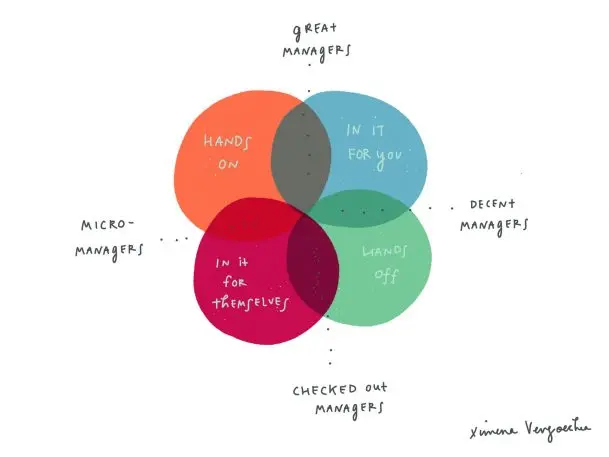Many types of people become managers, and they employ many different leadership styles once they do. And considering the wide spectrum of personality traits there are out there, you’d think that would lead to a multitude of managerial types. But according to Ximena Vengoechea, you’d be wrong.
A design researcher at Pinterest as well as a Fast Company contributor who writes prolifically about management, work culture, and mentorship, Vengoechea believes most bosses basically fit into four categories:
- Hands on, and in it for themselves
- Hands on, and it it for you
- Hands off, and in it for themselves
- Hands off, and in it for you
“Obviously,” she adds, “the ones where they are in it for themselves are less effective for the individual.” Also a talented illustrator, Vengoechea maps out this framework like so:

1. Hands On, In It For Themselves
Vengoechea doesn’t mince words: “Get a new manager!” Bosses who hover and nitpick, either because they’re on a power trip or they just assume you’ll screw it all up, are bad at the fundamentals of supervising other people. “It’s hard to grow when you’re being micromanaged and your manager is taking all the credit,” she points out. You can’t work for someone who doesn’t trust you and only looks out for their own interests.
Of course, bad bosses who fall into this category can be broken down a bit further by their other quirks and habits. Some, for example, may be highly indecisive; others might set habitually unrealistic expectations. There are a few ways you can try to adapt to each of these habits, but that’s really just in order to make work livable while you finagle a transfer to another team internally or look for a new job altogether.
2. Hands On, In It For You
Yes, this type of boss may have some micromanaging tendencies, but as Vengoechea cautions, “Don’t assume the worst from ad hoc check-ins. Your manager may just be proactive about helping you grow.”
Give this type of boss the benefit of the doubt (sometimes micromanaging is a symptom of work-related stress, by the way) and use it as an opportunity to improve how you communicate. “Let them know where you need their help and brainpower,” Vengoechea advises. That includes sharing when you don’t need it.
But as long as you can tell that your boss has your best interests at heart, try to see their hands-on approach as an opportunity for mentorship. As Vengoechea explained previously in Fast Company, “If a manager checks in outside of your normally scheduled one-on-one meeting, relax. Don’t automatically assume the worst and put your guard up. Consider the possibility that rather than trying to micromanage, your new boss may be trying to find ways to help, so be more receptive.”
Related: These Are The 3 Traits Of Bosses That Everyone Wants To Work For
3. Hands Off, In It For Themselves
If your boss seems mostly concerned about their own status and advancement and uninterested in yours, that’s of course not an ideal situation. But it doesn’t necessarily mean you should run for the hills.
Vengoechea suggests first trying to test your theory about why your boss is keeping their distance–and, as she explained in a separate Fast Company story, it’s usually due to one of two reasons: “They’re either checked out at work in general, or they totally trust you.” She breaks down the best strategies for both scenarios here, but claims that in general, it’s smart to “be proactive about following up, show that one-on-ones matter, [and] widen their window onto your work.”
These efforts can all help build a bridge to a distant manager. But if you don’t make progress at deepening your rapport, Vengoechea says it’s time to look for a different boss. “It’s hard to grow if your manager doesn’t have your best interests at heart.”
4. Hands Off, In It For You
It’s not the worst thing in the world to have a boss who keeps their distance simply because they trust you to get the job done.
Here, too, the onus is on you to communicate what you need. Vengoechea suggests expressing gratitude for their trust and “share when you want more input, check in on their goals and how you can help, [and] ask for feedback.” As she put it in her previous article, it’s all about “acknowledg[ing] that you feel empowered to make decisions and run with ideas autonomously, thanks to their support. But don’t be afraid to spell out scenarios where their perspective might be helpful and productive for you.” Typically, a manager who cares about your professional development will make a greater effort to get more involved when you need that.
Related: The Management Formula Every Leader Should Know (In One Easy Chart)
“Researchers have found that employees’ relationships with managers is one of the most decisive factors in the decision to look for another job versus stay put,” Vengoechea points out, “which means that the type of manager you have matters a lot–it’s going to determine your growth in a role or in a company, as well as your happiness and fulfillment day-to-day.”
So no matter what type of manager you have, Vengoechea says, “make sure you are following the key tenets of ‘managing up’ : Understand their goals, and how you can help; learn what communication style works for them (and you!), give feedback on them, and on what you need; [and] share your wins.” Not all boss-employee relationships are win-wins, but for those who keep these basic rules in mind, more of them can be.
Recognize your brand’s excellence by applying to this year’s Brands That Matter Awards before the early-rate deadline, May 3.
